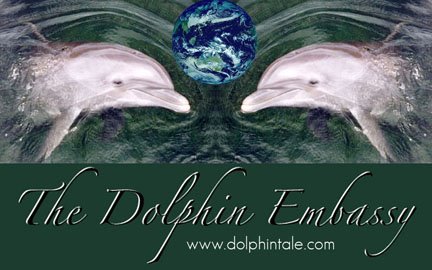In 2010 a small group of self-selected scientists and activists gathered in Helsinki, Finland to discuss the rights of cetaceans under international law. Their stated purpose was to formulate a declaration of rights and to garner international support for such a declaration. The conference, entitled "Cetacean Rights: Fostering Moral and Legal Change", produced a declaration signed by the 11 members of the 'Helsinki Group'.
While this declaration is well intended, certain elements in it do not represent the well-being of some cetaceans, especially those 'who have nowhere else to go'.
Because the Dolphin Embassy project and the Cetacean Studies
Institute have done extensive research on this expanding population around the
world, and have come to recognise the very real importance of protecting their
needs against short-sighted, albeit well-meaning, efforts by activist
organisations, a revision of the Helsinki Declaration has been
undertaken.
The revised declaration is presented here. Comments are
welcome, and the revised declaration is open for further revision.
To see the original Declaration of Rights for Cetaceans, as
produced by the Helsinki Group, you can see their site here.
Declaration of Rights for Cetaceans:
Whales, Dolphins, and Porpoises
Based on the principle of the equal treatment of all persons;
Recognizing that scientific research gives us deeper insights into the complexities of cetacean minds, societies and cultures;
Based on the principle of the equal treatment of all persons;
Recognizing that scientific research gives us deeper insights into the complexities of cetacean minds, societies and cultures;
Recognizing
that increased human interaction with cetaceans has produced deeper insights
into their biological, social, and psychological requirements;
Recognizing that cetaceans have participated in mutually beneficial relationships with humans and have demonstrated adaptive capacity such that they manifest fully complex lives in built environments;
Noting that the progressive development of international law manifests an entitlement to life and well-being for cetaceans;
We affirm that all cetaceans as persons have the right to life, liberty and well-being.
Recognizing that cetaceans have participated in mutually beneficial relationships with humans and have demonstrated adaptive capacity such that they manifest fully complex lives in built environments;
Noting that the progressive development of international law manifests an entitlement to life and well-being for cetaceans;
We affirm that all cetaceans as persons have the right to life, liberty and well-being.
We conclude that:
1. Every individual cetacean has the right to life, safety, clean water, and a sonic environment that does no harm.
2. No cetacean shall be taken into captivity or be removed
from their natural environment unless not doing so would endanger their
survival. Any cetacean taken into human care shall be returned to their natural
environment when feasible, determined on both biological and compassionate
grounds. If not feasible it shall be provided an enriching environment that includes socialization with
other cetaceans and with humans. Cetaceans in human care shall have the right to bear offspring, recognising this as an important part of their social and biological nature. Any cetacean
born in a human-managed environment has special status with a life-long responsibility
for their care by humans.
3. No
cetacean shall be subject to cruel treatment.
4. All
cetaceans not in human care have the right to freedom of movement and residence within their
natural environment.
5. No
cetacean is the property of any State, corporation, human group or individual,
but may become a ward of such entities if necessary to protect and safeguard
their life and well-being. Cetaceans who have come into human care, by natural circumstances or circumstances that are irreversible, shall be provided all due care for the duration of their natural lives.
6.
Cetaceans have the right to the protection of their natural environment.
7.
Cetaceans have the right, equal to protections provided for human cultures, to not be subject to the disruption of their cultures.
8. The
rights, freedoms, and norms set forth in this Declaration shall be protected
under international and domestic law as well as an international framework
under the administration of the United Nations in which these rights, freedoms,
and norms can be fully realized.
9. No
State, corporation, human group or individual shall engage in any activity that
undermines these rights, freedoms and norms.
10.
Nothing in this Declaration shall prevent a State from enacting stricter provisions
for the protection of cetacean rights as long as the well-being of cetaceans is
foremost in such provisions.
Originally agreed and signed,
22nd May 2010, Helsinki, Finland
Revised
by the Cetacean Studies Institute, Dec. 2013-Oct. 2014, Queensland, Australia


No comments:
Post a Comment